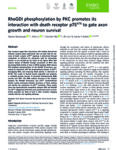Cell Reports publishes today our latest paper describing a structure-function map of the death domain of the p75 neurotrophin receptor (Charalampopoulos et al. 2012)
Structural determinants underlying signaling specificity in the tumor necrosis factor receptor superfamily (TNFRSF) are poorly characterized and it is unclear whether different signaling outputs can be genetically dissociated. The p75 neurotrophin receptor (p75NTR), also known as TNFRSF16, is a key regulator of trophic and injury responses in the nervous system. In this paper, we describe a genetic approach to dissect p75NTR signaling and decipher its underlying logic. Structural determinants important for regulation of cell death, NF-kB and RhoA pathways were identified in the p75NTR death domain. Pro-apoptotic and pro-survival pathways mapped onto non-overlapping epitopes, demonstrating that different signaling outputs can be genetically separated in p75NTR. Dissociation of JNK and caspase-3 activities indicated that JNK is necessary but not sufficient for p75NTR-mediated cell death. RIP2 recruitment and RhoGDI release were mechanistically linked, indicating that competition for DD binding underlies cross-talk between NF-kB and RhoA pathways in p75NTR signaling. These results provide new insights into the logic of p75NTR signaling and pave the way for a genetic dissection of p75NTR function and physiology.
Read the full paper HERE.


